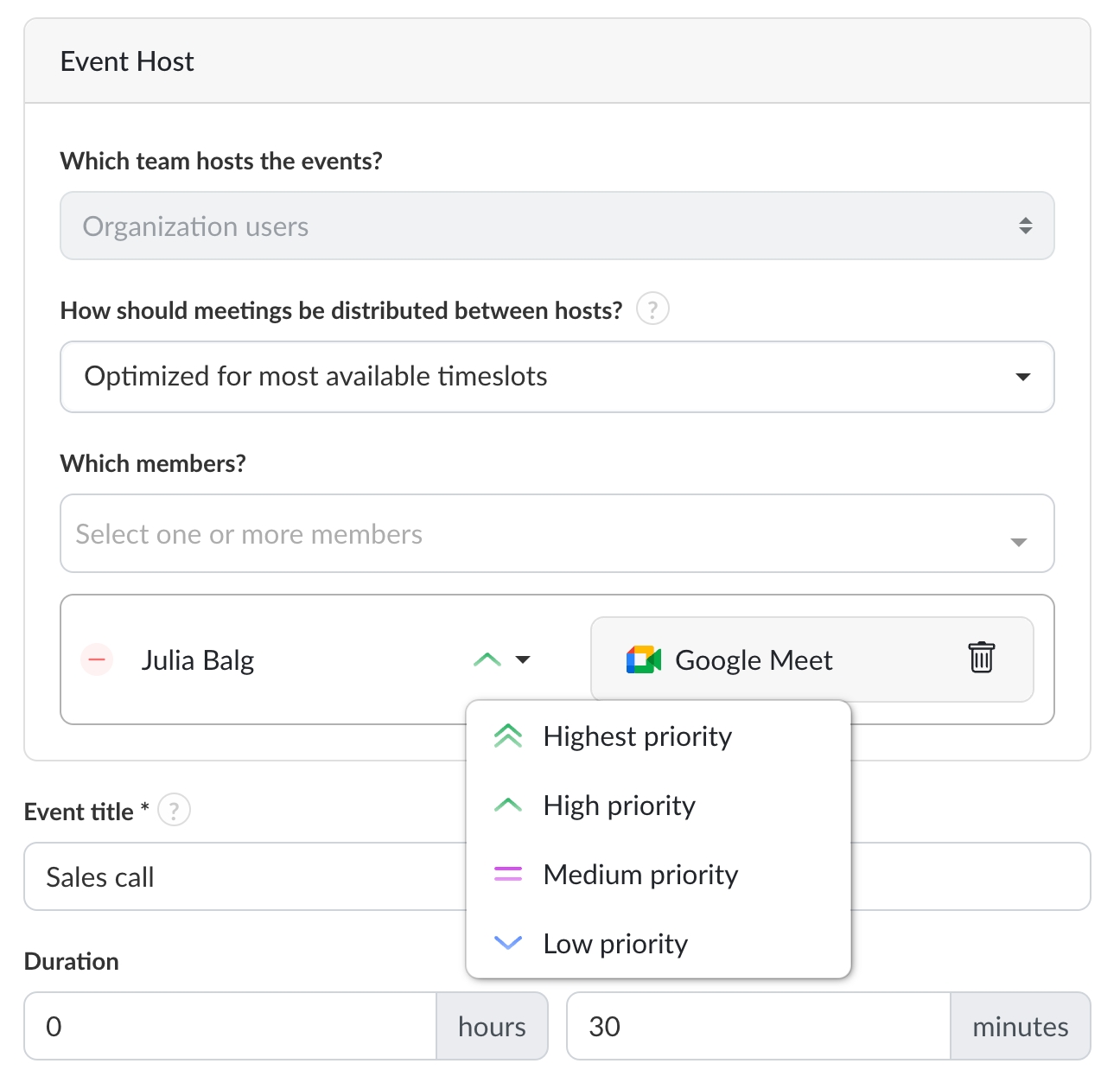Wie die Round-Robin-Termin-Verteilung funktioniert?
In Zeeg's Round-Robin-Termin-Planungsseite hast du die Flexibilität zu wählen, wie Termine zwischen Gastgebern verteilt werden.
In Zeeg's Round-Robin-Termin-Planungsseite hast du die Flexibilität, zwischen zwei unterschiedlichen Methoden zur Verteilung von Terminen unter Gastgebern zu wählen:
Optimieren für die meisten verfügbaren Zeitfenster: Diese Option ermöglicht es Eingeladenen, Termine zu buchen, wann immer ein Gastgeber verfügbar ist. Sie ist ideal, um die Anzahl potenzieller Terminen zu maximieren, wenn eine gleichmäßige Verteilung der Termine zwischen Gastgebern von geringerer Priorität ist.
Optimieren für gleiche Anzahl von Ereignissen pro Gastgeber: Bei dieser Option werden Termine gleichmäßig auf Gastgeber verteilt und sorgen so für eine ausgewogene Arbeitsbelastung. Diese Methode kann jedoch insgesamt zu weniger gebuchten Terminen führen, da die gleichmäßige Verteilung Vorrang vor der Verfügbarkeit der Gastgeber hat.

Wie funktioniert "Optimieren für die meisten verfügbaren Zeitfenster"?
Wenn du die Option "Optimieren für die meisten verfügbaren Zeitfenster" in Zeeg's Round-Robin-Termin-Planungsseite wählst, arbeitet das System wie folgt:
Verfügbarkeitsprüfung: Zeeg weist den Termin nur einem Gastgeber zu, der aktuell verfügbar ist. Das System prüft sowohl Zeeg's interne Verfügbarkeit als auch die verbundenen Kalender der einzelnen Gastgeber, um conflicting events zu identifizieren. Dies stellt sicher, dass der Termin zu einem Zeitpunkt geplant wird, an dem der Gastgeber frei ist, um teilzunehmen.
Gastgeber-Priorität: Der Termin wird dem Gastgeber zugewiesen, der unter allen verfügbaren Gastgebern die höchste Priorität hat. Du kannst die Priorität jedes Gastgebers einfach anpassen, indem du die Prioritätsoption in den "Grundeinstellungen" der Terminplanungsseite verwendest. Dies ermöglicht es dir, bestimmten Gastgebern eine höhere Priorität für Terminplanung zu geben.
Zuletzt am wenigsten Eingeplant: Falls zwei oder mehr Gastgeber die gleiche Priorität haben, weist Zeeg den Termin dem Gastgeber zu, der für die spezifische Terminplanungsseite am wenigsten kürzlich eingeplant wurde. Dieser Ansatz gewährleistet eine faire Verteilung von Terminen unter Gastgebern mit der gleichen Prioritätsstufe.
Zufällige Zuweisung: Wenn Teammitglieder nach Berücksichtigung von Verfügbarkeit, Gastgeber-Priorität und zuletzt am wenigsten Eingeplant immer noch gleich sind, weist Zeeg den Termin zufällig unter den infrage kommenden Gastgebern zu. Dies bietet ein Element des Zufalls, wenn alle anderen Kriterien gleich sind.
Wie funktioniert "Optimieren für gleiche Anzahl von Ereignissen pro Gastgeber"?
Wenn du die Option "Optimieren für gleiche Anzahl von Ereignissen pro Gastgeber" in Zeeg's Round-Robin-Terminseite wählst, arbeitet das System wie folgt:
Überwachung der Terminanzahl: Zeeg überwacht kontinuierlich die Anzahl der Termine, die mit jedem einzelnen Gastgeber auf der Round-Robin-Termin-Planungsseite gebucht wurden.
Vergleich der Terminanzahl: Das System vergleicht die Terminanzahl aller Gastgeber und identifiziert, ob jemand mindestens drei Termine vor den anderen liegt.
Verfügbarkeitsanpassung: Wenn ein Gastgeber drei Termine voraus ist, werden seine verfügbaren Zeitfenster nicht auf der Buchungsseite angezeigt, bis die Terminanzahl der anderen Gastgeber aufholt.
Beispiel: Wenn Ava 3 Termine hat und Julia 0 Termine, wird Zeeg Avas Verfügbarkeit ausblenden, bis Julia 1 Termin hat. Sobald Julia aufgeholt hat, werden Avas verfügbare Zeitfenster wieder angezeigt. Wenn Ava erneut eingeplant wird und das relative Verhältnis wieder auf +3 (4 zu 1) zurückgeht, wird Avas Verfügbarkeit erneut ausgeblendet, bis die Verteilung ausgeglichen ist.
Last updated